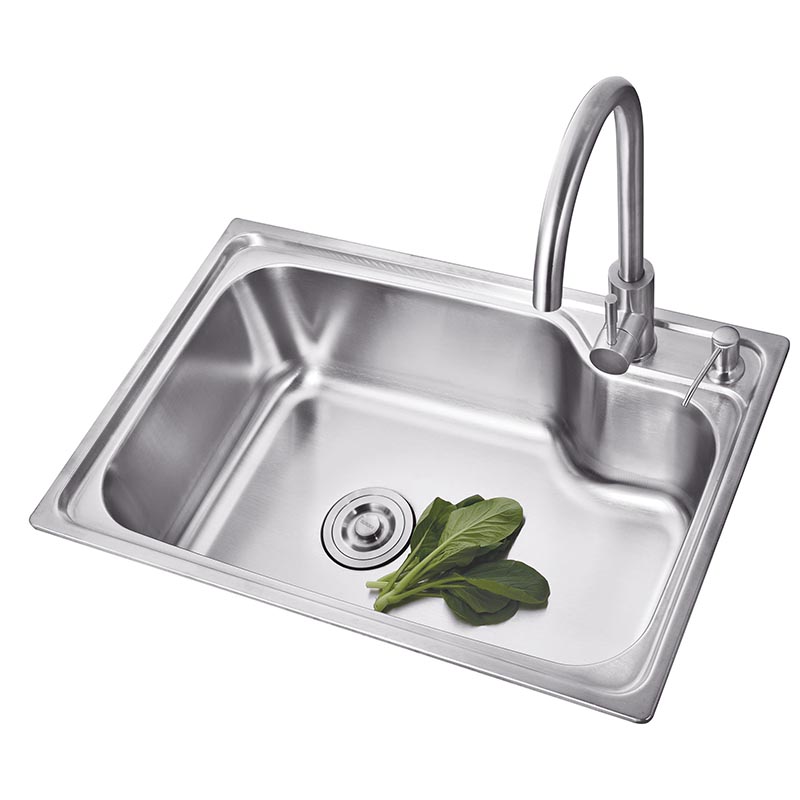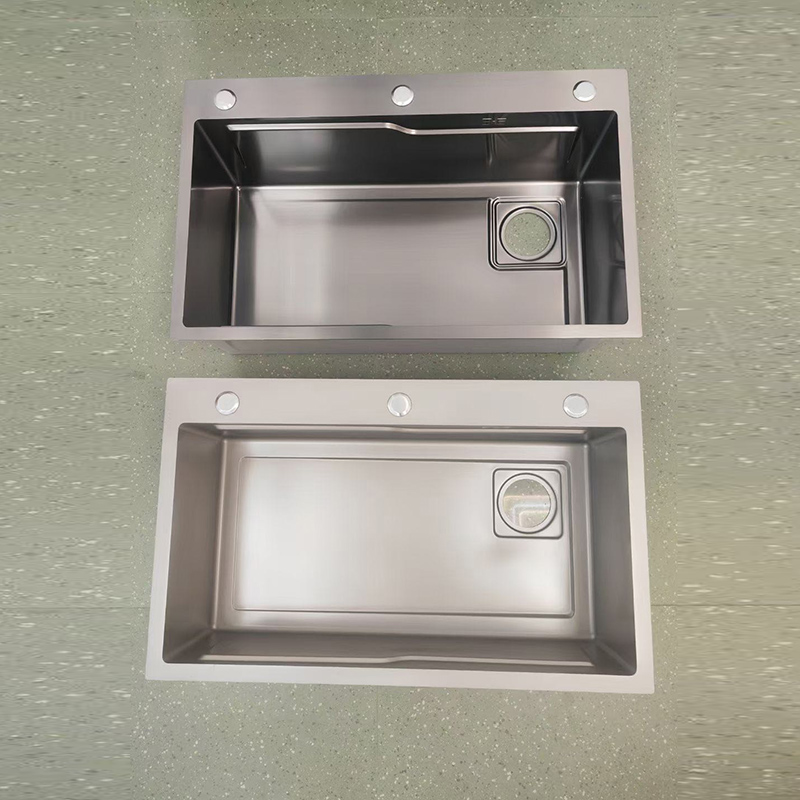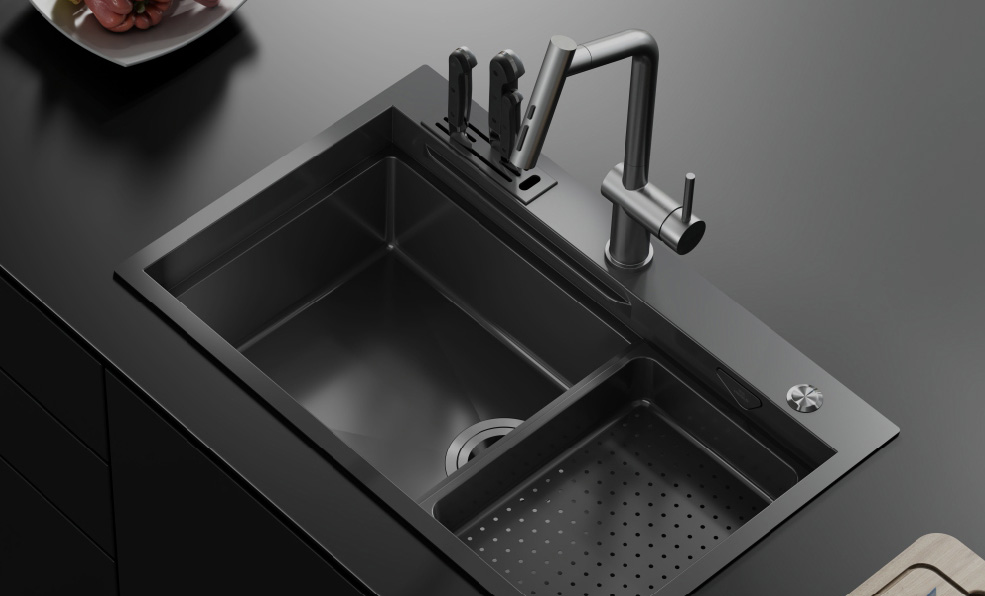What is Gauge in Stainless Steel Sinks
October 12, 2024
When deciding on a stainless steel sink gauge , you'll often see the period "gauge" used. But what does it imply? Simply put, the indicator of a stainless steel sink refers back to the thickness of the metallic. The lower the gauge amount, the thicker the metal. This thickness influences the sink's durability, strength, and longevity.
This article will explain gauge, why it is relevant to your sink, and how to pick a first-class gauge that fits your desires. Let's dive into the information.

What gauge stainless steel sink is best?
The best gauge for a stainless steel sink depends on how you intend to use it. A 16—or 18-gauge sink is the top choice for most kitchens. These sinks are thick enough to resist dents and scratches, making them durable.
Two of the high-quality models available are the SL-7546 and BAY-6845 . Both sinks are crafted from top-class stainless steel, providing appropriate energy and fashion stability. These fashions have a current look and are designed to deal with everyday kitchen tasks without difficulty. Whether you want to scrub big pots or prep meals, these sinks perform excellently and look appropriate.
Understanding the Gauge Number
The gauge number in a stainless steel sink installation shows the steel's thickness. A not-unusual variety for kitchen sinks is between 16 and 22 gauge. You could assume a better broad variety way thicker steel. However, it is the alternative. The lower the quantity, the denser the steel.
Here's a breakdown:
16 gauge is the thickest option. This sink is very robust and sturdy.
18 gauge: It is slightly thinner than 16 gauge but pretty intense. Many people choose 18-gauge sinks because they are stable in energy and affordable.
20 gauge: Thinner and less expensive. However, it can dent or scratch more effortlessly.
22 gauge is the thinnest choice, generally used for financial sinks. These sinks may be more prone to harm and might feel flimsy.
Why Does Gauge Matter for Stainless Steel Sinks?
Durability: A thicker sink (like a 16 gauge stainless steel sink) will last longer and withstand dents and scratches higher than a thinner one. A thicker sink is suitable if you use heavy pots and pans or do numerous cooking.
Noise: Thicker sinks are quieter. Thin sinks may be noisy when water hits them, or you drop something inside. Manufacturers regularly add soundproofing to thinner sinks, but thicker ones muffle sound.
Appearance: Thicker stainless steel sinks generally look and experience excellent stability. They have a top-class feel and often include a brushed or shiny end, adding a modern touch to kitchens.
Heat Resistance: Stainless steel sinks, regardless of gauge, are outstanding at managing warmth. However, thicker sinks manage high temperatures from hot pans better without warping or displaying wear over time.

Which Gauge Should You Choose?
Your desire depends on some elements, like your finances, kitchen utilisation, and alternatives. Here's a guide:
For Heavy Use: If you cook dinner loads or have a hectic kitchen, cross for a 16 or 18 gauge stainless steel sink. These sinks can handle consistent use without showing a lot of wear and tear. They are durable kitchen sinks , robust, and worth the funding.
For Light Use: If you're within a decent price range or don't prepare dinner regularly, a 20—or 22-gauge sink may work for you. Remember that thinner sinks are more likely to dent or scratch over time.
For Quieter Kitchens: If noise bothers you, a lower gauge (like sixteen or 18) will help reduce the sound of clanging dishes or running water. You can also search for sinks with more soundproofing pads or coatings.
Where Can I Buy a Gauge Stainless Steel Sink?
If you want to shop for a best gauge stainless steel sink, check out Zhongshan Hanensi Hardware Co. This agency is a trusted supplier for producing durable and stylish stainless steel sinks. They offer sinks in exceptional gauges, making it easy to discover one that suits your kitchen needs. Whether you are after a solid 16-gauge sink or something lighter like an 18-gauge, Zhongshan Hanensi Hardware Co. has you covered. Their sinks are made with excellent substances, ensuring long-lasting use and overall performance.
FAQs
What is the quality gauge for a stainless steel sink?
The excellent gauge depends upon your wishes. A 16—or 18-gauge sink is generally the great alternative for most kitchens because it's durable, sturdy, and quieter.
Is a higher or lower gauge higher for stainless steel sinks?
A lower gauge is better because the steel is thicker. Thicker steel is more long-lasting, resistant to dents, and quieter than thinner steel.
Do stainless steel sinks rust?
Excellent stainless steel sinks don't rust. They are made from materials that oppose rust and erosion, making them a phenomenal choice for extended, enduring use.
In Wrap Up
Understanding the gauge of a stainless steel sink is essential when deciding on the right one for your kitchen. The gauge influences the sink's sturdiness, noise level, and look. A 16—or 18-gauge sink is suitable for heavy use and long-term durability, while a 20—or 22-gauge sink may be extra cheap, but a good buy is much less intense.
In addition to the gauge, consider how regularly you use your sink and what type of look you want in your kitchen. You could enjoy a beautiful, long-lasting, and quiet stainless steel sink for many years with the proper gauge.
